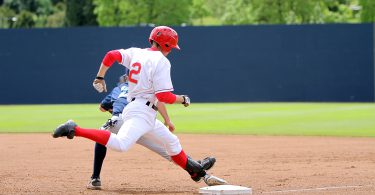“When I get snail mail letter and it’s been hand written, that gets my attention […] When those come in the mail, they mean something and I really dive into that.” -Jeff Willis, Head Coach, LSU-Eunice on ABCA Calls From the Clubhouse Episode 85
We’ve written extensively about how the internet, social media, and technology can help you get recruited on a budget. If you are serious about playing college baseball and haven’t read them, here are the links to several very useful articles on the topic:
Using Technology to Help Get Recruited
Tip of the Cap to Pitching Ninja: Using Social Media to Get Recruited
Should You Use and Online Recruiting Profile
The Importance of a Diverse Recruiting Plan
However, in this article, we want to talk about one “old school” gesture that coaches are sure to appreciate—a hand-written letter. Silly as it might seem, a hand-written letter can help you get recruited, even though it has nothing to do with your talent or ability to play baseball. Sounds too good to be true, right? The human element of something hand-written adds a personal touch to your recruitment that is sure to stick out to coaches, who are used to looking through dozens of interest emails each day. 99% of recruits won’t sit down and write a hand-written note or letter, so when you do, you’ve already differentiated yourself from the pack in one way. Keep reading to find out more about why hand-written notes can be a difference maker and when to use hand-written letters or notes.
Why Hand-Written Notes Leave an Impression
Hand written notes may seem like inefficient eyewash in the age of email, texting, and social media, but taking the time to write a personalized letter or note serves a real purpose. For starters, the effort behind quality hand-written communication tells a coach that you have done your homework and are serious about their program. It shows genuine interest instead of simple convenience. It tells them that they are more than a fleeting thought in your busy day. It tells them that you have a plan in place and are thinking ahead. Anyone can copy the body of an email, make a few changes, and send it off to a large number of coaches. Nobody writes a snail-mail letter by hand just because. That alone makes you stand out from the 50 interest emails that the coach also receives on that same day.
Another benefit of hand-written communication is that it plays on the personal side of recruiting. You may look at coaches as baseball or recruiting machines, but believe it or not, they are people with feelings and emotions. Making positive emotional connections may not replace low standard of play, but it will give you some wiggle room or maybe even a second look. Recruiting is about more than just baseball. It’s about character, personality, and many other non-baseball characteristics that are critical to finding a fit and putting together a successful team. Just as you get fired up over interest from a school, college coaches get excited when they feel like a player really wants to play for them. They want to feel wanted by recruits, just like you want to feel wanted by coaches! Don’t underestimate this human element in recruitment. When you show that you are thankful, give coaches your time and effort, and build strong personal connections, good things happen.
Like a well-timed email or DM, a hand-written note still needs to be part of a bigger plan and backed up by talent, good grades, and everything else coaches are looking for. Your hand-written communication should include appropriate follow up and follow through in other areas of recruitment. Hand-written letters shouldn’t replace electronic communication (that would be very inefficient!), but rather work in tandem with it. Think of the stamp and ink as one deposit of your overall investment into pursuing that coach and program and coaches. It’s not a magic pill, but it can push you over the top or help separate you from the pack.
By now, I think you get the point. We’ll leave you with a short list of times when we feel like a hand-written note is appropriate and can have maximum impact:
As a good luck note at the start of the season or before a big game
As a happy holidays note
At the end of your season or their season as a recap and thank you for the time they have put into recruiting you
As a thank you note following…
- A campus visit
- A coach coming out to a game to see you play
- A camp where you worked with or played in front of the coach
We’ll stop there. It’s time for you to put pen to paper!







